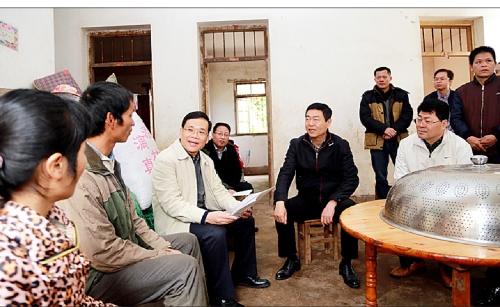Enhanced supervision for targeted poverty alleviation
chinagate.cn by Ai Yang, March 23, 2016 Adjust font size:
 |
|
Huang Jianbo, procurator of Nanning Procuratorate, Guangxi Zhuang Autonomous Region, visited several households in a number of poor villages targeted for poverty alleviation at the end of 2015. [Photography by Chen Minger] |
Targeted plans and special actions to enhance poverty alleviation
The poverty alleviation campaign affects more than 70 million rural Chinese living below the poverty line.
In 2015, the procuratorate organ in Shannan Prefecture, Tibet Autonomous Region, conducted an investigation on job-related crimes. They focused on cases with large amounts of funds and insufficient information disclosure that involved procedures where problems were likely to arise. Liu Zhigang, prosecutor of Shannan procuratorate, told reporters that they had dealt with a case concerning the director of the water bureau in Comai County, Shannan Prefecture, who was suspected of corruption. Supervisors on the case began their investigation after being tipped off; after studying the relief fund policy for Comai County and analyzing financial records, they discovered that the director had used fraudulent invoices to embezzle a significant amount of relief funding meant for farmers. In 2015, crimes involving agricultural poverty alleviation programs accounted for 14 percent of all job-related crimes in Shannan Prefecture. It saved millions of yuan for the country.
On a broader scale, the numbers demonstrate that the watchdog has indeed performed its duty. According to statistics from the Supreme People’s Procuratorate, a total of 35,240 people were investigated and punished from 2013 to 2015 due to duty-related crimes in agricultural poverty alleviation, accounting for 22.3% of all people found guilty by the watchdog in the same period. A total of 10,769 people were found guilty just in the first 10 months of 2015. Of those, 827 people were found guilty in poverty alleviation and development work, while 9,942 were found guilty in agricultural poverty alleviation work.
Targeted prevention to enhance the agricultural poverty alleviation system
In the next five years, the target is still to prevent such crimes, investigate and punish those found guilty according to law, ensuring that the relevant crime rate is lowered to a minimum during the poverty alleviation campaign.
To further strengthen work in this regard, Liu Yongfu, director of State Council Poverty Alleviation Office, led a team with the Supreme People’s Procuratorate to conduct research.
The two government bodies conducted a joint study and issued the “Opinion on Strengthening Communication and Coordination in Poverty Alleviation Duty-Related Crime Prevention Work”. The paper clarified the key focuses and measures for the prevention of corruption.
In recent years, watchdog departments across the country have gradually accumulated experience. According to the job-related crime prevention department of the procuratorate in Gansu Province, it has launched cooperative efforts with 22 provincial agricultural departments, requiring each county and village authority to report their management, agricultural policies and programs, fund totals, and affected areas to a watchdog agency. All policies, funds, and implementation results are disclosed to farmers in a timely manner, strengthening administrative transparency in local governments and villages.